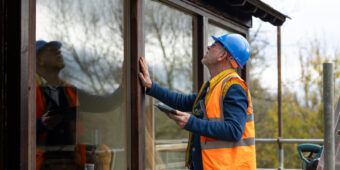Impact of Covid-19 on building projects
09 Sep 2020, Industry News, Uncategorized

The completion dates of home building projects in the June 2020 quarter were delayed by nearly seven weeks on average, Stats NZ has reported
“Covid-19’s impact on project delays was, in most cases, longer than the Level 4 lockdown, during which all non-essential work had to stop. In some cases, construction projects were delayed for two months or more,” said acting building statistics manager Dave Adair.
Home builders are expecting median delays of 33 working days as a result of the Level 4 lockdown, which was in place until the last week of April, and subsequent worksite restrictions. Non-residential projects, including commercial office buildings, shops, and hotels, are estimated to have completion dates set back by a median of 30 working days.
The median is the mid-point in a range – one half reports shorter delays, the other half reports longer delays.
“These insights reflect the opinions of the quarterly building activity survey respondents, who described the impacts of Covid-19 on their projects, whether that be realised or expected,” Adair said.
A sample of just over 1,000 responses mentioning COVID-19 were included in this analysis. The responses contained information around the realised and/or expected impacts of COVID-19 on 419 residential projects and 604 non-residential projects.
More than 90% of the more than 1000 building firms that offered comments in the survey mentioned delays, although the range of comments varied significantly. In most cases, projects were delayed for 20 to 60 working days. The delays were longer in some cases, although factors other than Covid-19 may have been at play. A small group of respondents noted their projects had been put on hold until conditions improved.
The delays experienced were often partly attributed to factors other than the lockdown, although still as a result of Covid-19. These factors included:
- Loss of favourable weather – some projects were further slowed down by wetter winter months, after being extended.
- Labour – contractors had in some cases been in high demand, leading to longer wait times for work to be carried out.
- Building supplies – decreased stocks of some building products were noted, as well as delays in shipping materials into New Zealand.
- Reduced productivity – some loss of productivity due to increased health and safety measures introduced to slow the spread of Covid-19, such as social distancing at work sites.
“Some responses also linked delays to increased costs, although the situation is complex and there were other factors influencing this,” Adair said.
A quarter of survey respondents mentioned financial implications, with most reporting an increase in costs. The most common were higher labour costs, holding costs such as holding inventory and hiring scaffolding, ongoing costs such as mortgage payments and insurance, and material costs. These related to costs incurred while projects were on standby, as well as those that reflected the impacts felt throughout supply chains.
Around 5% of respondents gave an indication of the size of these additional costs. Most projects were likely to have incurred Covid-19-related costs of less than 2% of the total project value. Although this is not a conclusive measure of cost implications, it does give an idea of how some projects have been affected financially.
“Respondents also mentioned delays in receiving income, with some unable to rent out or sell their buildings when they had expected to, and others having to find more funds to continue the project,” said Adair.
Around 11% of respondents also said it was harder to get the right resources, be that labour, materials, or both. Quite often this lack of resources was linked to project delays. One of the most common themes was that sub-contractors were spread too thinly between jobs, and this possibly exacerbated delays, impacted schedules, and added to costs.
Register to earn LBP Points Sign in



